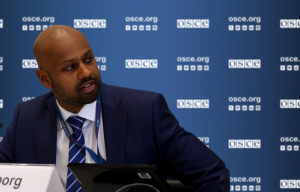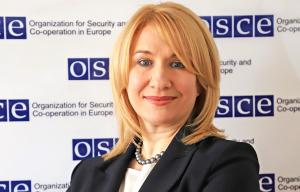Martin Dexborg
Gender Adviser, Politico-Military Dimension - OSCE Secretariat

I am a Gender Adviser for the politico-military dimension based in the Secretariat Gender Issues Programme in Vienna. I have a Master’s degree in political Science, but I would say my practical field experience is what mostly aligned with my work on gender equality at the OSCE. I believe it is crucial to be able to explain how policy frameworks developed in Vienna have a practical application in our field operations. Prior to the OSCE, I spent about 15 years working at various international organizations and NGOs across the globe , including Afghanistan, Georgia, the Middle East, South Sudan and other parts of Africa, as well as Indonesia. Despite having lot of field experience, I had never worked at a Headquarters environment before coming to the OSCE Secretariat.
My scope of work at the Organization is extremely wide. As security environments tend to be traditionally very male-dominated, the OSCE has placed a lot of effort in redefining the concept of security and making the Organization more gender sensitive. From gender mainstreaming efforts to dispose rocket fuel to training of border professionals in another participating State to organizing roundtables on violence against women in another country, I advise stakeholders to make our programmes and initiatives gender-sensitive to ensure that boys, girls, men and women are positively impacted by our work.
In order to get the job done, I have to liaise with a variety of stakeholders including representatives of civil society, government and other organizations as well as colleagues from across the region. One of the things that really struck me working at the OSCE is the fact that most of our fields operations have been in place for many years. Our positive environment and collaborative approach to getting things done is one of the features that make the OSCE a very special organization.
At the OSCE, you learn something new every single day, both professionally and personally. Colleagues come from a variety of cultural and academic backgrounds. I have learned so much both from within and from outside my own field of expertise. I also think my experiences here will positively impact my trajectory for a post- OSCE career. One of the things I gained at the OSCE was better understanding of the international diplomatic environment. I have had the opportunity to attend meetings, engage with stakeholders and learn deeply about what it takes to make decisions that affect so many people in the northern hemisphere.
For individuals interested in joining the Organization, I would say that understanding the recruitment process is very important. The OSCE website has a lot of information and there are also webinars on preparing for competency-based interviews, preparing job applications or preparing for a written test. As an international secondee by Sweden, I saw the Gender Advisor position on a government website and liaised with my seconding authority prior to applying. But different participating States have different approaches, so I would recommend you check our site and contact your delegation to learn more how your participating State processes nominations. Just remember that you can only be considered if your participating States nominates you as the recruitment team has not access to non-nominated applicants.
I would encourage women and individuals with diverse backgrounds to consider the OSCE as an employer. Even if you don’t think you have a security-relevant background, there might still be opportunities for you here.
Interested in learning more about Martin's career journey and about our international seconded vacancies? Visit jobs.osce.org/webinars and watch our presentation on "Understanding the Secondment Process at the OSCE."

